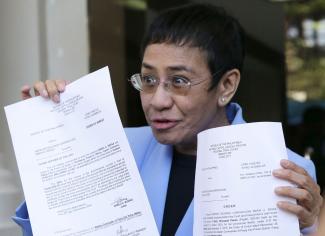Media
Brave professionals

The news website Rappler has become one of the Philippines’ “most popular and effective investigative journalism outlets, providing critical coverage of the administration of President Rodrigo Duterte”, according to the International Press Institute (IPI). The IPI is a global network of media professionals committed to independent journalism. This year, it gave its Free Media Pioneer award to Rappler, praising its “innovative approach to journalism” as well as its “determination to hold authorities accountable despite aggressive attacks on its operations”.
Indeed, Rappler has become a target. In response to its diligent coverage of human-rights violations in Duterte’s so-called “war on drugs” (see my contribution in the focus section of D+C/E+Z e-Paper 2018/12), the president and his supporters have been attacking the news website – and not only rhetorically. In early December, Maria Ressa, Rappler’s top editor and chief executive, voluntarily surrendered to the local court that issued a warrant for her arrest. She had to post bail for her temporary release.
Earlier, Duterte had banned her and one of her reporters from covering events at the presidential palace Malacañang. He called Rappler a “fake news outlet” and declared that it is illegally owned by Americans. The Philippine Securities and Exchange Commission (SEC) revoked Rappler’s licence to operate for allegedly violating the rule that media entities must be 100 % Filippino-owned. Moreover, the Philippines´ Department of Justice indicted Rappler Holdings Corporation for alleged tax evasion. Allegedly, taxes had not been paid for the issuance of bond-like financial instruments called Philippine Depositary Receipts (PDR) in 2015.
Rappler is actually not the only media company to have issued PDRs to foreign investors, but it is the only one that had its registration revoked. A shutdown was only averted by a court order. The judges demanded that the SEC reinvestigate the matter.
Rappler’s lawyer, Francis Lim, insists that Rappler is 100 % Filipino-owned. He also points out that there was no tax evasion since the company is not a securities trader. Ressa states that she has done nothing wrong: “Because I’m a journalist, I’m now labelled a criminal and can go to prison for 10 years.”
Many people saw the licence revocation as the government’s attempt to silence a highly effective critic. Observers pointed out that leaders with authoritarian tendencies have used similar means to discredit and thwart independent news outlets in other countries, including Turkey, Russia, India or Hungary, for example.
International appeals to the Duterte administration to change its stance, however, have so far fallen on deaf ears. Ma Salvacion “Inday” Espina-Varona, a journalist, reports that colleagues “face death threats, vilification campaigns and revocation of access to coverage, for doing what journalists are supposed to do — questioning official acts and claims, especially on issues of human rights and corruption”.
When Reporters without Borders awarded her its Press Freedom Prize for Independence in London in November 2018, Varona pointed out that, since the restoration of “a fragile, perpetually threatened democracy” in 1986, 185 journalists were killed – 12 of them in the first two years of Duterte’s rule. The international non-governmental organisation praised her “extensive reporting on sensitive issues” and her role in the Filipino equivalent of the #MeToo campaign, which is fighting misogyny.
Also in November, Maria Ressa received the Committee to Protect Journalists’ Gwen Ifill Press Freedom Award. At the awarding ceremony in New York, Sheila Coronel, who teaches journalism at Columbia University, reminded the audience of Duterte calling journalists “bullshit”, “garbage” and “sons of bitches”. The professor accused the president of “weaponising the internet – unleashing fake news and troll armies” (also see Alan C. Robles in the focus section of D+C/E+Z e-Paper 2018/05). Coronel lauded Rappler’s courage to reveal such malpractice and expose police impunity in the war on drugs: “They told the truth – and so made enemies.”
Emmalyn Liwag Kotte is a freelance journalist who lives in Germany.
emmalyn320@hotmail.com






